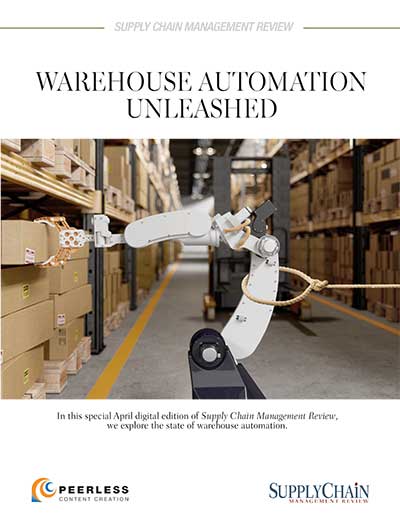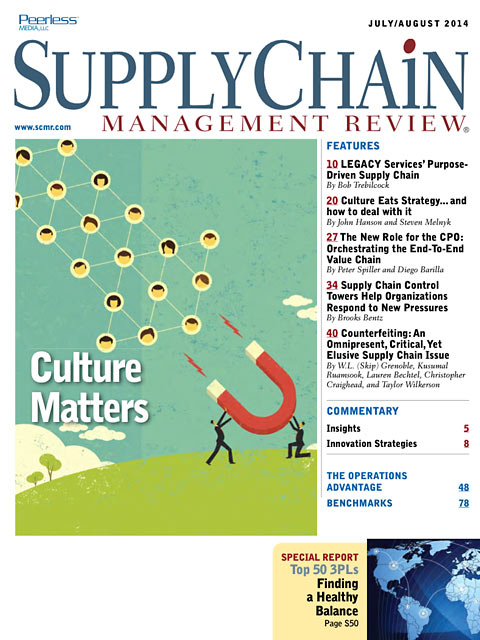Sorry, but your login has failed. Please recheck your login information and resubmit. If your subscription has expired, renew here.
July-August 2014
LEGACY Supply Chain Services has made company culture the centerpiece of how it drives innovation, efficiency, and the creation of value for its customers. Is it a model that others should replicate? Browse this issue archive.Need Help? Contact customer service 847-559-7581 More options
Corporate culture is much in the news, and not in a good way. Ron Johnson’s disastrous tenure as CEO of JCPenney has been described as a clash of cultures between Johnson’s lieutenants from Apple and Penney’s old guard. More recently, a scathing internal report cited culture as the culprit behind GM’s failure to address problems with defective ignition switches that led to more than a dozen deaths. “GM Takes Blame, Vows Culture Shift” read the headline in the Wall Street Journal.
Culture is often a convenient boogey man for failure. When a company, or its supply chain, is at the top of its game, management gets the credit. When things go awry, as they did at Penney and GM, culture takes the blame. But what happens if the two are aligned? What happens if management takes the core values and mission statements hanging in every board room to heart? What if management translates those values into demonstrable behaviors that “form the foundation of their company” and are used to measure the performance of its leadership team? Can something as soft, fuzzy, and intangible as culture be a force to improve conventional supply chain metrics and deliver a competitive advantage?
The answer to all of those questions is yes, according to LEGACY Supply Chain Services, a privately-held North American 3PL with more than 2,700 employees. Headquartered in Portsmouth, N.H., LEGACY offers a full complement of warehousing, distribution, transportation, and customs brokerage services to companies in a variety of industries. In 2009, LEGACY refocused its mission to place an emphasis on a sustainable and measurable company culture model that serves as the foundation of the company, is the basis for management reviews, and is a force that can be shaped to drive performance (See Exhibit 1). While financial measurement typically drives most organizations, “culture comes first” at LEGACY, according to CEO Ron Cain.
 |
This complete article is available to subscribers
only. Click on Log In Now at the top of this article for full access. Or, Start your PLUS+ subscription for instant access. |
Not ready to subscribe, but need this article?
Buy the complete article now. Only $20.00. Instant PDF Download.
Access the complete issue of Supply Chain Management Review magazine featuring
this article including every word, chart and table exactly as it appeared in the magazine.
SC
MR
Sorry, but your login has failed. Please recheck your login information and resubmit. If your subscription has expired, renew here.
July-August 2014
LEGACY Supply Chain Services has made company culture the centerpiece of how it drives innovation, efficiency, and the creation of value for its customers. Is it a model that others should replicate? Browse this issue archive. Access your online digital edition. Download a PDF file of the July-August 2014 issue.
 |
Download Article PDF |
Corporate culture is much in the news, and not in a good way. Ron Johnson’s disastrous tenure as CEO of JCPenney has been described as a clash of cultures between Johnson’s lieutenants from Apple and Penney’s old guard. More recently, a scathing internal report cited culture as the culprit behind GM’s failure to address problems with defective ignition switches that led to more than a dozen deaths. “GM Takes Blame, Vows Culture Shift” read the headline in the Wall Street Journal.
Culture is often a convenient boogey man for failure. When a company, or its supply chain, is at the top of its game, management gets the credit. When things go awry, as they did at Penney and GM, culture takes the blame. But what happens if the two are aligned? What happens if management takes the core values and mission statements hanging in every board room to heart? What if management translates those values into demonstrable behaviors that “form the foundation of their company” and are used to measure the performance of its leadership team? Can something as soft, fuzzy, and intangible as culture be a force to improve conventional supply chain metrics and deliver a competitive advantage?
The answer to all of those questions is yes, according to LEGACY Supply Chain Services, a privately-held North American 3PL with more than 2,700 employees. Headquartered in Portsmouth, N.H., LEGACY offers a full complement of warehousing, distribution, transportation, and customs brokerage services to companies in a variety of industries. In 2009, LEGACY refocused its mission to place an emphasis on a sustainable and measurable company culture model that serves as the foundation of the company, is the basis for management reviews, and is a force that can be shaped to drive performance (See Exhibit 1). While financial measurement typically drives most organizations, “culture comes first” at LEGACY, according to CEO Ron Cain.
 |
SUBSCRIBERS: Click here to download PDF of the full article. |
SC
MR

Latest Supply Chain News
- Tech investments bring revenue increases, survey finds
- Survey reveals strategies for addressing supply chain, logistics labor shortages
- Israel, Ukraine aid package to increase pressure on aerospace and defense supply chains
- How CPG brands can deliver on supplier diversity promises
- How S&OP provides the answer to in-demand products
- More News
Latest Resources

 Explore
Explore
Topics
Latest Supply Chain News
- Tech investments bring revenue increases, survey finds
- Survey reveals strategies for addressing supply chain, logistics labor shortages
- Israel, Ukraine aid package to increase pressure on aerospace and defense supply chains
- How CPG brands can deliver on supplier diversity promises
- How S&OP provides the answer to in-demand products
- AI, virtual reality is bringing experiential learning into the modern age
- More latest news
Latest Resources

Subscribe

Supply Chain Management Review delivers the best industry content.

Editors’ Picks





